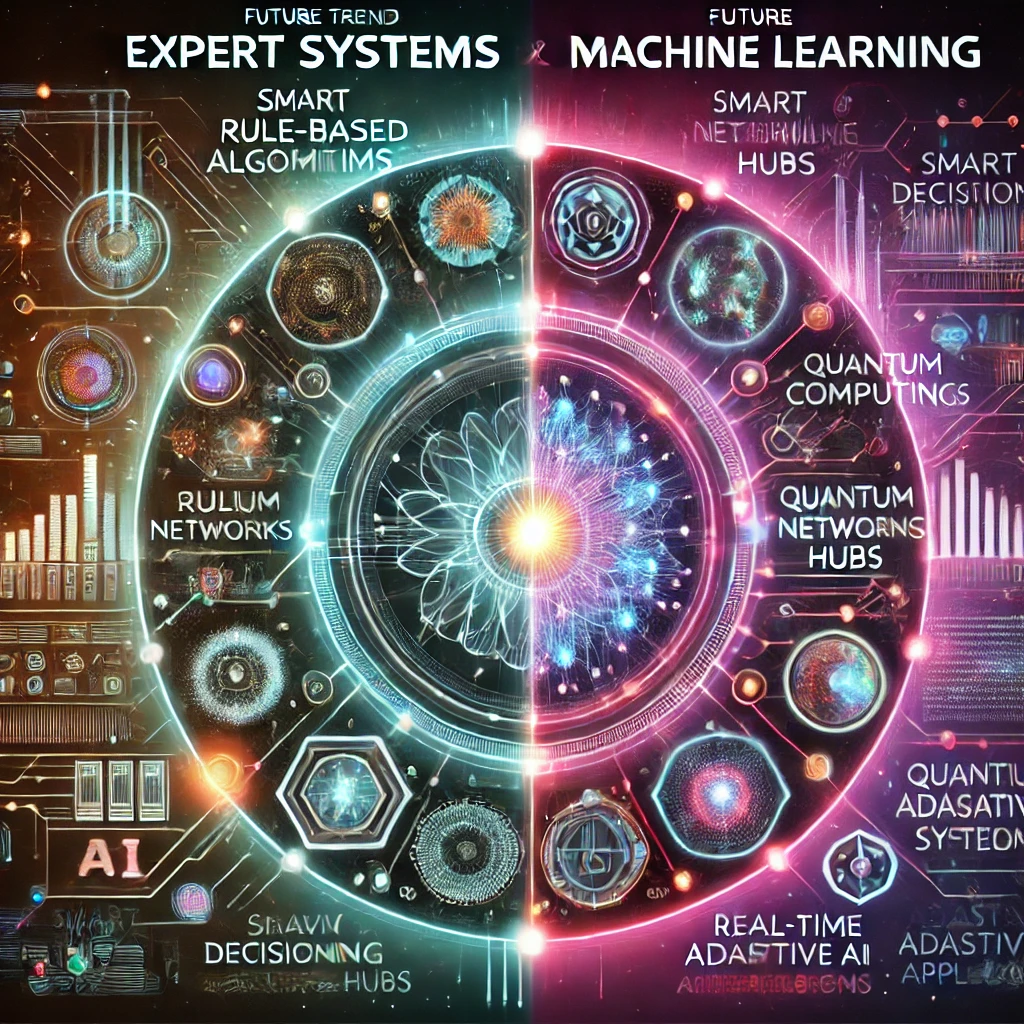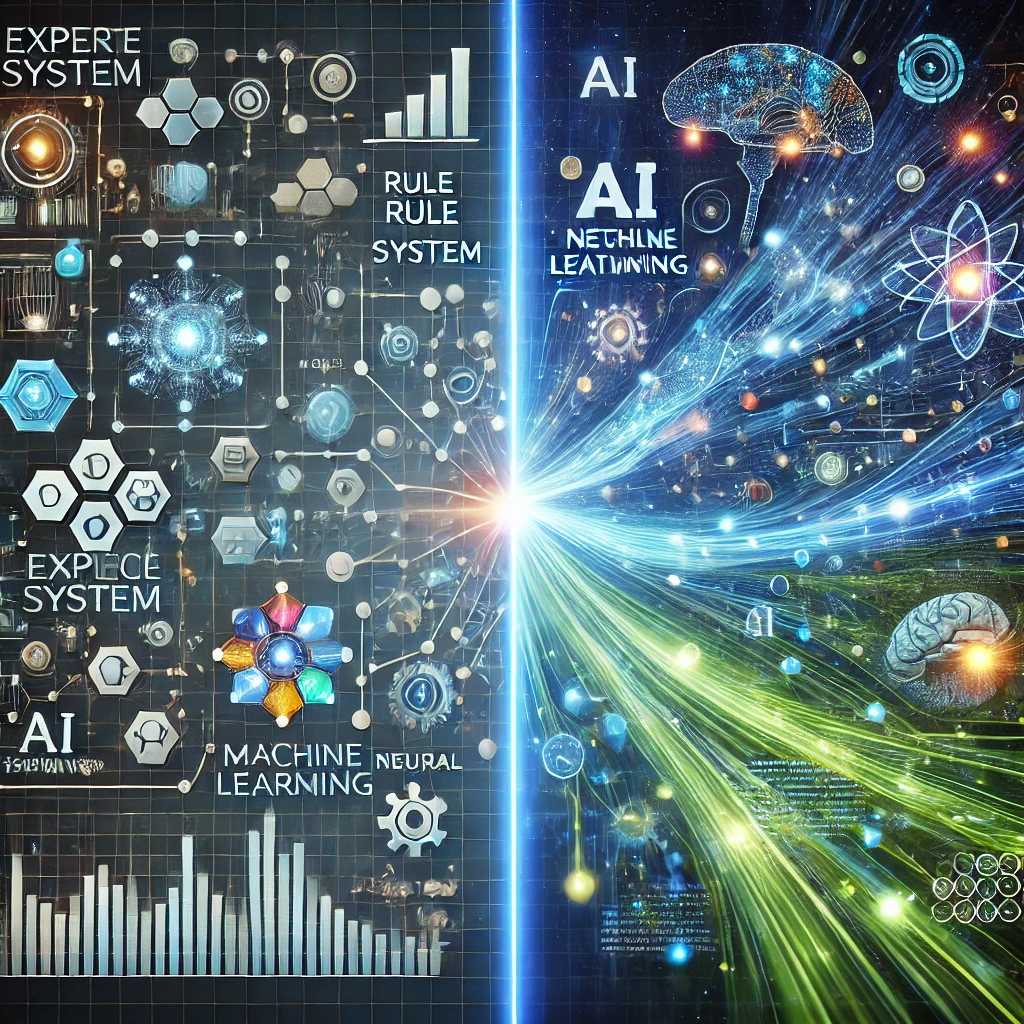
Expert System vs Machine Learning
Artificial Intelligence (AI) is revolutionizing industries, and two of its most prominent subsets, expert systems and machine learning, are often the focus of discussions. But what sets these two apart, and how do they contribute to modern technology? Let’s dive deep into the world of AI to unravel these concepts
What is an Expert System?
An expert system is a computer program designed to mimic the decision-making ability of a human expert. These systems operate based on a set of predefined rules and a knowledge base.
Key Components of an Expert System
👉Also Read What are the Key Components of an Expert System
Knowledge Base: Stores facts and rules about a specific domain.
Inference Engine: Applies logical reasoning to the knowledge base to derive conclusions.
User Interface: Allows users to interact with the system.
How Expert Systems Work
Expert systems rely on rule-based reasoning. They use “if-then” statements to simulate human expertise. For example, in medical diagnosis, an expert system might suggest treatments based on symptoms provided by the user.
Example Applications
Healthcare: Assisting doctors with diagnostics.
Finance: Evaluating loan applications.
What is Machine Learning?
Machine learning (ML) is a branch of AI that allows computers to learn from data without being explicitly programmed. Unlike expert systems, ML models improve over time as they are exposed to more data.
Categories of Machine Learning
Supervised Learning: Learning with labeled data.
Unsupervised Learning: Identifying patterns in unlabeled data.
Reinforcement Learning: Learning through trial and error.
How Machine Learning Works
Machine learning involves feeding data into algorithms to create predictive models. These models can identify trends, classify information, or make decisions based on historical data.
Real-World Examples
Predicting stock prices
Recommending products on e-commerce platforms
Key Differences Between Expert Systems and Machine Learning

Approach to Problem-Solving
- Expert Systems: Use predefined rules for decision-making.
- Machine Learning: Learn patterns and adapt to new data.
Handling of New Data
- Expert Systems: Limited to their initial programming.
- Machine Learning: Continuously improve with more data
Comparison Table: Expert System vs Machine Learning
| Feature | Expert System | Machine Learning |
|---|
| Learning Ability | Static | Dynamic |
| Data Dependency | Minimal | High |
| Flexibility | Limited | High |
| Maintenance Effort | High | Moderate |
Advantages of Expert Systems
Efficient for well-defined tasks.
Consistent and reliable in decision-making.
Advantages of Machine Learning
Adapts to new data and situations.
Applicable across a wide range of industries.
Limitations of Expert Systems
Cannot handle ambiguity or learn from new data.
Require extensive knowledge engineering.
Limitations of Machine Learning
Depend heavily on large datasets.
Susceptible to biases in training data.
Real-World Applications of AI and Expert System
Expert Systems
- Healthcare: Diagnostic tools.
- Finance: Fraud detection.
Machine Learning
- Autonomous Vehicles: Navigation and decision-making.
- E-commerce: Personalized recommendations.
Integration of Expert Systems and Machine Learning
Hybrid models combine the rule-based precision of expert systems with the adaptive capabilities of machine learning, offering robust solutions for complex problems.
Future of Expert Systems and Machine Learning
With advancements in AI, both expert systems and machine learning are evolving. From enhancing healthcare diagnostics to revolutionizing customer experiences, the future is bright for these technologies.
FAQs
1. What are the main differences between Expert Systems and Machine Learning?
Expert systems rely on predefined rules, while machine learning models learn from data and adapt over time.
2. Can Expert Systems learn from data?
No, expert systems are static and cannot learn or adapt to new data.
3. Is Machine Learning always better than Expert Systems?
Not necessarily; expert systems are better suited for well-defined, rule-based problems.
4. What industries benefit most from these technologies?
Healthcare, finance, e-commerce, and autonomous systems benefit significantly.
5. How can I get started with AI?
Begin with learning basic programming and explore AI frameworks like TensorFlow or PyTorch.
From a competitive standpoint, this gives a real advantage. Companies/individuals who understand key insight will be ahead of those still using outdated approach. Great strategic thinking!